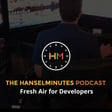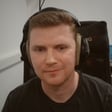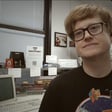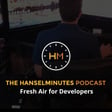Become a Creator today!Start creating today - Share your story with the world!
Start for free
00:00:00
00:00:01

The Past Still Boots with the Interim Computing Museum's Stephen Jones
Scott talks with Stephen Jones of the new Interim Computing Museum, about the craft of bringing old computers back to life. From wire-wrapped boards to tape drives and terminals, this episode dives into why running the old systems — not just displaying them — matters for understanding how modern computing came to be.
Support, Visit, and Donate to the ICM at http://icm.museum
This episode is sponsored by TextControl and CodeRabbit
Check out https://textcontrol.com for industry-leading document editing and PDF processing SDKs for .NET developers
For effortless AI code reviews, go to https://coderabbit.ai
Transcript
TextControl's Influence and Engagement
00:00:00
Speaker
Hey friends, you probably knew that TextControl is a powerful library for document editing and PDF generation, but did you also know that they're a strong supporter of the developer community and it's part of their mission to build and support a strong community by being present, by listening to users, and by sharing knowledge at conferences across Europe and the United States.
00:00:19
Speaker
If you're heading to a conference soon, Maybe check if TextControl will be there. Stop by and say hi. You'll find their full conference calendar at textcontrol.com. That's T-E-X-T, control.com.
Interview with Stephen Jones: Vintage Computing
00:00:34
Speaker
Hi, friends. I'm Scott Hanselman. This is another episode of Hansel Minutes. Today, I have the distinct pleasure of chatting with Stephen Jones, former senior engineering manager at Living Computer Museum and now at Interim Computer Museum. How are you? I'm doing fine. Thanks, Scott.
00:00:51
Speaker
This is great. We got to meet each other in person at the first time at the Portland Retro Gaming Expo, which was just a delight in Portland, Oregon every year. It was massive. All generations were were there and present. And the Interim Computer Museum was there with a ton of hardware.
00:01:09
Speaker
Yeah. We had eight tables, actually. Hans Reuter invited us to come down to his booth, gave us eight tables and scrambled to get a bunch of things together for it.
00:01:22
Speaker
Is that such a challenge, though? i mean, when you're moving vintage hardware, are you afraid you're going to break something or it's going to get shaken up? Or do you just put it in the back of a car and do the best you can? Well, i think we did pretty good. we We used moving blankets. And most of the things that we brought were microcomputers, and you know typically like Commodore 64s, where hundreds of thousands of units were produced.
00:01:45
Speaker
But the most fragile thing we brought was 1970 MLAC PDS-1,
00:01:51
Speaker
And that was for running Space War. And that survived the trip. So I'm happy about
Origins of the Living Computer Museum
00:01:58
Speaker
that. Fantastic. So at the Living Computer Museum, where you were at for many years, I remember visiting, going up in Seattle and...
00:02:09
Speaker
It was Living Computer Museum, and then later it became Living Computers Museum and Labs. It had vintage tech. It had contemporary tech. Was this all part of Paul Allen's kind of collection of vintage computing hardware and his like habit of restoring systems? Because I know he loved this long before he started the museum.
00:02:27
Speaker
That's right. This actually goes back ah to PDP Planet. And even before PDP Planet, there was 1997, the first machine the first machine called the Toad One ah was brought online and posts on AltSys PDP10 was made in December of 97. Oh, wow.
00:02:47
Speaker
allow to And to invite people to use this system and request accounts and such. So there there was this idea to to have vintage systems remotely accessible for a long time and then into the PDP Planet days.
00:03:05
Speaker
And then finally in 2012, ah Bob Barnett and Robert Michaels were able to open what became living computers.
Challenges in Computer Museums
00:03:17
Speaker
People associate living computers with Paul Allen probably because he was the one who had the most money and the most equipment. But it sounds like the passion for living computers in the non-proper noun way of of saying it, computers that are actually still working, not broken things behind glass, it it predates Paul. There's a whole group of people that are excited about retro computing, including myself.
00:03:42
Speaker
Absolutely, yeah. And there's been a number of computer museums over the years that have come and gone, most notably the Boston Computer Museum, which was actually started by DAC, i was acquired by the Computer History Museum, gosh, about 25 years or so ago, maybe maybe longer ago, actually, and was stored at Moffett Field for a long time before CHM got the Silicon Graphics building.
00:04:11
Speaker
Is this an uncommon thing? I mean, there's, you can go and see art everywhere. Every city has an art museum, but other than living computers and maybe MIMS, uh, museum of technology, I don't personally know of, I don't think about every city having its own computing museum.
00:04:30
Speaker
There are quite a few actually in the state of ah varying sizes. Uh, and then and you'll come across just the, the most amazing collections.
00:04:42
Speaker
there's There's one in Ome, which is outside of Tokyo, that ah it's called the Micron Museum or the Dream. Let's see. oh What do they call it? ah so Something about dream technology.
00:04:55
Speaker
But I got to visit that last year. That was amazing collection. And I just had never heard of it. They're in a, I think they're in a former MUFG Mitsubishi Bank building and that they crowdfunded and, and, and got.
00:05:12
Speaker
And it's, ah that is a pretty amazing collection. Of course, it's Japanese heavy as far as what they have, but they've got some amazing things. Yeah. And there's the, I guess there's a computer history museum in Mountain View. There's one in Bozeman, ah Montana.
00:05:29
Speaker
But I feel like I'd love to see a world where there was one in every city, ah certainly in North America. would be It would be glorious if anyone could have that feeling of of seeing these machines working 50 years after their first shipping.
Importance of Interactive Exhibits
00:05:41
Speaker
I can guarantee you there's probably at least 10 basements in every city. that has a mini museum with running. That is absolutely true. And a lot of people have these things and they don't know what to do with them and they don't know how to get involved.
00:05:53
Speaker
ah You know, I've got a lot of of older stuff, certainly not anything as as wonderful as the things that are behind you. For folks that might be seeing this on YouTube, ah Stephen is in the Interim Computer Museum right now, and there's working machines behind him of all flavors, and he was so kind enough to go into the office today.
00:06:11
Speaker
I'm afraid all I was able to do was bring my my little Altair Mini, and I've got my Piedie from Obsolescence Guaranteed behind me. This is all I can handle. But you're right, the the basements of many people of a certain age exist and and ready to go. and they don't know where to do these things, what to do with them. But can they make donations or they just do do you just need cash to make museums like this work?
00:06:36
Speaker
I think, well, in my experience, especially with living computers, the community is the most important aspect. And it's not, I mean,
00:06:49
Speaker
there's There's a lot to say about funding, ah but it's really about the community you build around your museum and those people supporting either by volunteering or just um you know becoming members or supporting doing things or and and sharing stories as well, because that's that's really the benefit of having a community-focused museum.
00:07:14
Speaker
The other thing too is that Most technology museums or history museums do not have ah technical staff. In fact, I found that many museums may have a curation curation team, but they tend to have outsourced the building of exhibits and even bringing in contractors for interpretation.
00:07:37
Speaker
So but they keep the staff minimal. And that was a big difference for living computers that We had know seven full-time engineers, which is just unheard of for any technical museum.
00:07:52
Speaker
Yeah, that's a great point. Like knowing how to not just keep them running, whether it be replacing capacitors at the low level or whether it be at the high level of designing, what is it that someone should see on this machine? What game should they be able to play?
00:08:04
Speaker
What app is going to light up a little kid's eyes when they see it running on one of these vintage machines? That does require effort. You can't just put them in a box behind glass and say, look at that old thing.
Impact of the Pandemic on Museums
00:08:16
Speaker
It's got to be interactive. That's right, yeah. When the computer is behind glass, I mean, what are we celebrating here? and it's You're celebrating industrial design, which is great.
00:08:29
Speaker
There's a lot of great industrial design and product design that go into these machines and devices. But to have the the visceral experience, whether you've had it before or you had it for the first time you know at a museum,
00:08:45
Speaker
that that's really important to convey the importance of preserving these machines. Yeah, it's so important. Like restoration and, you know, making the the formerly white, now yellowed plastic outside is not just, you have to have interaction readiness of these Vintiv machines, which I know that you oversaw everything from restoration to keeping them keeping them running.
00:09:08
Speaker
Now, I had brought my kids, I've got pictures of my kids at Living Computer Museum. I know that but So many people in the Northwest and all over the world that visited living computers have pictures of their families and the excitement of that, like you said, that visceral thing.
00:09:22
Speaker
But then and when it closed operations during COVID, it didn't just hit living computers. It hit like all the kind of interactive centers whose business model was visitor access. It wasn't just rich people keeping the thing running. It was community, that as you point out, that kept it running.
00:09:39
Speaker
Yeah. Yeah, it really was. You know, and one thing that LCM had going for it at that point was the remote systems that ah were part of PDP Planet originally, you know, predated the opening of the museum.
00:09:56
Speaker
Those were still available online and people could experience the museum ah through through that. But then, you know, also think as as we came out of COVID, all the protocols, you know, especially 20, you know,
00:10:10
Speaker
twenty you know late 2020, 2021. I just hope we never have to go through that again. But, it you know, the hand sanitity sanitizing and masks and all of that, that had to be done and limiting numbers of of people that could be together. It's, we really lived through ah horrible experience. And, you know, I would say that in regards to
00:10:43
Speaker
How LCM had thought about reopening at that point, it was very measured at that time. And of course, we didn't we didn't end up doing that.
00:10:55
Speaker
yeah And it's worth noting that there when you have a collection of art, or in this in this case, it is art, these these vintage computer machines, there's the ones that are owned by Paul Allen's estate. There's ones that are owned by the underlying museum, independent nonprofit.
00:11:09
Speaker
And then there's, of course, the business model, which is the operational, you know, keeping the lights on from a month by month. And that's from the perspective of someone who loved the Living Computer Museum. I was like, why doesn't a billionaire just fix it?
00:11:22
Speaker
It's more complicated than that. And now the... the the Living Computer Museum is gone and that that model was not able
Community Support and Sustainability
00:11:30
Speaker
to succeed. But what what is different about the Interim Computer Museum, which has so much of those the assets and how can we keep it alive?
00:11:39
Speaker
Well, I think the the big difference is, again, having this community focused and community supported. Right now, the real real focus is covering the lease, covering the utilities and getting the word out, participating in the community events like Portland Retro Gaming Expo. And and next year, we've got Vintage Computer Festival Pacific Northwest coming back in May, which we're sponsoring.
00:12:13
Speaker
ah So i I'm... My team is being really measured in regards to that. We've got, let's see, as of today, 356 members and sponsors, and there's various various tiers for that.
00:12:31
Speaker
But we've we also just had our first... um um let's see, a surplus quarter, so that three months of not having a deficit, you know, so that that's really good. We're, we're, we're showing that, you know, focusing on, on just preserving what we have with some limited space and, and, and having it supported by the community that that's the trajectory we're on when it gets to the point of whether or not there's going to be jobs or contractors, you know, that that's the next step. but for now,
00:13:09
Speaker
we're We're kind of, we're we're on a trajectory. I should also mention that SDF.org, which is also an organization I'm a part of and is a long running community focused, basically an ISP. started as a bulletin board system in 1987, moved to Unix in 1990, and then got the internet in 1991. And it nonprofit.
00:13:33
Speaker
and then got on the internet ninety ninety one and it ah formed as a nonprofit rather than commercial entity. So even though it didn't make a lot of money through the 90s, it was able to get to a self-sustaining model with through membership by the end of the 90s.
00:13:53
Speaker
And it basically survived top bomb because of that. And it's because it has such a long history, you know it there tends to be retro aspects to it.
00:14:05
Speaker
but it's always been about the Unix platform and ah hosting what the community wants, facilitating new ideas on this Unix platform without trying to be too retro.
00:14:20
Speaker
um if you You probably had a dial-up ISP account in the 90s, and one of the options was a shell account. I mean, almost every ISP had shell servers, and sadly, that kind of died out mostly because of security issues, ah but because SDF's strong community around the Unix shell, it's that's just the main part of it.
00:14:47
Speaker
And then we build upon that. So Interim Computer Museum, however, took on the vintage remote systems that SDF had had done and then had combined with living computers um remote systems. And this is in a GeekWire article from last year in June, were announcing that that had been done.
00:15:12
Speaker
So Interim Computer Museum is a new nonprofit that was formed this year. We got our charitable status in April. And so that that's the retro is here.
00:15:23
Speaker
and SDF is continuing to do its its modern Unix things. And and f SDF is worth calling out for not just the services that they've provided for so very long, but also these vintage systems, if you want to explore them, you can go to connect.sdf.org and search basically SSH from your browser, or if you like SSH from your command line into their menu.
00:15:46
Speaker
And there's a dozen or more vintage systems that are living and playing up there that you can run. Some are simulators and some are are real. So if you don't have an Altair Mini behind you like I do or a simulator of a PDP-11, you or your kids or your family can go and play with that.
00:16:02
Speaker
And joining and paying as a member is extremely easy. It's free for students. And certainly even a lifetime membership can still only be like $36.
Stephen Jones' Background and Passion
00:16:14
Speaker
So you can really make a big difference when you get involved with either SDF or or ICM. And I think I told you before we started recording that I signed up at the exec level for ICM.
00:16:25
Speaker
And in doing that, I get permission to visit. And I think that's the most important thing is that if you're in or around the Interim Computer Museum by becoming a member, you get to go and make an appointment and bring the bring the family and check it out. And that gets to the point of community, right? A museum is nothing unless people can see it and touch these things.
00:16:44
Speaker
Yeah. And again, like like you said, that bootstrap membership, which is the bootstrap membership is $36 year. And that is actually the legacy vintage systems program that was at SDF.
00:17:00
Speaker
Lovely. And that gets you access to 26 remote systems. It's a mix of real hardware, hybrid hardware, and which which has part partial simulation and then full simulation.
00:17:17
Speaker
And it's... Oh, one thing you mentioned, you the PiDP 11. So this is a great great example. and And the PiDP10 is an also interesting example as well, because the sheer numbers that have been produced of those versus how many actually were created by Deck, it's staggering that Oscar has made so many.
00:17:41
Speaker
I think he's over a thousand PiDP10s and of course Deck only made maybe 260 of but of the k but It's if you're using these systems remotely, real hardware or simulated hardware.
00:17:58
Speaker
Again, the focus is the community. We have contrib directories and structures where people can write their own programs and share it with each other or toward a game that was, you know, only on some obscure Unix platform, you know, to to many other Unix platforms.
00:18:16
Speaker
So that that's the focus of remote access and then As far as visiting is concerned, so currently we're opening open Saturdays, Sundays and Mondays, 10 to 4.
00:18:29
Speaker
And like you mentioned, a sponsor level, ah you know, you can bring yourself or you can bring your family, you know, or bring some friends and introduce them to the museum. museum Hey friends, this is Scott. I want to thank our new sponsor Code Rabbit.
00:18:45
Speaker
You know, we're shipping more code than ever, and that means there's more code reviews than ever. So that must mean that all these code reviews are going to slow me down. Is that right, Aravind? Not exactly, Scott.
00:18:57
Speaker
but vi That's where we also come in. Code Rabbit exactly cuts your code review time into half and your bugs into half. ah We give you the p feedback right in your PR context and helping your developers move faster ah while they are also generating code more faster.
00:19:15
Speaker
ah We offer one-click fixes and spot all the bugs and refactor issues, deliver it on your own Git workflow and help you move really faster in the AI era.
00:19:27
Speaker
CodeRabbit offers free AI code reviews directly in your code editor. Fix those bugs, find those defects, especially the ones that were introduced by Vibe Coding, and it all does it without breaking your flow state.
00:19:38
Speaker
So you will be able to ship more code than ever. I encourage you to check it out at coderabbit.ai and sign up for a free trial now. how did you get involved in this? You don't, you're, you seem like an old soul, but you have a young face if I may say so.
00:19:53
Speaker
So you're in, and so you're somewhere between 29 and something else. thank you and I'm curious, you know, how did you become like, how did you get a career in vintage computing?
Relevance of Vintage Computing
00:20:06
Speaker
Let's see.
00:20:08
Speaker
Well, I mean, i guess I have to blame my dad. Uh, and, and, um, Because i went to college I went to Southern Methodist University and I was a classical guitar performance major.
00:20:21
Speaker
i I didn't, I realized- Of course you're running a vintage computer museum now. Makes total sense. And I realized pretty quick that it is really difficult, especially for classical guitar, to do anything after school except for you know teach.
00:20:40
Speaker
um If you're going to be out there performing, there is so much competition. vi Violinists, that's the same sort of thing. It's just, and it's, um you know, thanks to Segovia, the, you know, making the classical guitar a real classical instrument as opposed to just a parlor instrument.
00:21:00
Speaker
It's, it's just, it's a very difficult career, you know, unless you're just, you're lucky or you're brilliant or whatever. But I say it going back to my dad, so I grew up in a ah Bell System household.
00:21:18
Speaker
My dad worked for Bell Laboratories and my grandfather who was living ah living with us until the end of his life had worked at Western Electric and retired.
00:21:31
Speaker
And um my aunt and some of other family members also worked in the Bell System. So what did I do after high school? I started pulling cable for an AT&T installer ah managing PBX's, a private branch exchange telephone system. So and I always grew up with remote access.
00:21:55
Speaker
ah You know, fact, we didn't have a computer at home in the 80s. We had a terminal and that would dial in and connect to a machine. And, um you know, my dad would let me play games in the evenings.
00:22:10
Speaker
and he played games too. But so that's that's where it had the the Unix skillset that came from from that. But I would say I've always wanted to do something particularly with PDP 10s and those were just vanishing you know as soon as I was interested in them. It's like they just disappeared from the internet more or less in the early ninety s so that That's where the interest comes from.
00:22:42
Speaker
And I was one of the the people that responded to the AltSys PDP10 request for accounts on Xskeleton in 1997. And I still have an account on that machine. So that that's really where the where where that story goes As I get older and I both think about the AI future and about where we're going with computing, I also continue to look farther and farther back and I play with things like this. And I also built an Apple One ah from like 7,400 series parts on like ah ah on a board.
00:23:17
Speaker
And I explored some of those kits and even going back to building Ben Eater's 6502 from original parts. And i'm I'm realizing that more and more, I think we're forgetting how to drive stick shift.
00:23:31
Speaker
How important do you think it is in a world of JavaScript and AI that that young people and early in career computing people appreciate these things?
Evolution and Preservation of Computing
00:23:40
Speaker
Or are we just a couple of old guys that are looking towards the past? and Well, I think, ah you know, anytime i go to a VCF or like Portland Retro Gaming Expo, it just runs the gamut as far as people.
00:23:59
Speaker
and the community there. I mean, you see really young kids, teenagers, and then you see the old timers that live through it. the The reason why living computers is so important, I think, is that you can convey um what these machines do as opposed to just appreciating their, you know, the aesthetic or, you know, the 70s colors or 80s design, things like that.
00:24:27
Speaker
And It's that the one thing that always has struck me, especially, know, talk about AI, all of the things that the AI booms and busts that you saw out of Stanford and the MIT AI lab in the 60s through the 70s, the list machine stuff that was going on in the early 80s and, you know, through up into the 90s and the connection machine.
00:24:54
Speaker
There were there were all these really great attempts to do things and, and for whatever reason, you know, not, it's not always the the greatest concepts or the that that went out, you know, there's, there's, I wouldn't call them losers, but there's a lot of great things that get sidelined.
00:25:16
Speaker
And, you know, now, we have, you so many tools, you know, that that make retro computing easy. and Like your Altair 8800 right there. I mean, you just plugged it in and suddenly it's doing Pong. It's like, if that if you tried that in 75 or 76, that would have been like, you know, 15 minutes.
00:25:37
Speaker
15 minutes of flipping switches just to get the bootloader going. in the um Yeah, yeah. um You know, in your teletype chugging away at 10 characters per second, loading a paper tape. You know, you just had to flip a switch and it's like, oh I did have all the things like I did have the bootloader pre-done, but you're absolutely right.
00:25:54
Speaker
We're getting to experience these things and it's, it's very like cycles, almost cycle perfect, but it's a simulator, not an emulator, but but I feel like I'm there, but also I got to get rid of the boring bits, but I also feel like I know more about the cloud when I got like multitasking,
00:26:10
Speaker
Unix running on it and i was like, oh OK, I understand how they did it 50 years ago. So I'm thinking about how Altair got to Azure and how yeah you are connected to over a half century.
00:26:22
Speaker
Yeah. And you know, and that's a good point. That's a great point because you know we we kind of have the luxury now of being able to look back and spend time at on a lot of these things and and to have you know such large communities of interest of all ages, you know, where you can add a Wi-Fi dongle to an Atari 800 or, ah you know, it's like, and then there's servers.
00:26:53
Speaker
So, I mean, there you go. There's Azure. FujiNet is a great example of an adapter that ah works on so many different platforms, but it provides you with you know ROMs, community, new new software people have written, old software that's been preserved.
00:27:13
Speaker
And it seems like just about every month at least, I hear a new story of some code that's been uncovered and resurrected you know or transferred from an old tape or thought to be lost, mythical things.
00:27:28
Speaker
I was wondering, have you ever read ah Stephen Levy's book, Hackers? No. Oh yeah, of course. Yes. Okay. Yeah, so when I read when I read hackers, a lot of the things that were written in that book were just, you know, very mythical.
00:27:46
Speaker
And this had to do a lot with the MIT AI lab. It's like, you could read about them, yeah but you, you couldn't experience things like the, the incompatible time sharing system.
00:27:57
Speaker
Oh yeah. And is a 40 year old book. This is a 1984 book. And then there was a 1990, 1994 redo of this book, but it was heroes of the computer revolution. This book was ahead of its time in 84 telling us about how everything went down.
00:28:11
Speaker
They should teach this in schools. They should. Yeah. It should be a mandatory reading material. Yeah. But to it's, ah you know, even in the 90s, it was kind of a desert as far as ah AI labs work was concerned. I mean, of course, there's GNU Linux and things like that, that GNU project, which came out of MIT as well.
00:28:35
Speaker
ah But that's on the other side. The 36-bit stuff, it was just kind of, you know, stuck on tapes and sticky tapes and disk packs and things like that.
Preserving Digital Artifacts
00:28:48
Speaker
and no one had really had machines um to to read this stuff. ah Al Caso of BitSAvers has done a lot to recover things. And then, of course, it's just like I said, it seems like every month there's a new thing that's been uncovered and resurrected and reanimated. And I think it's such a great opportunity as a hobby. i love it because it's not just looking at old computers, but it's also dragging them, kicking and screaming into the future.
00:29:16
Speaker
So like Fujinet is plugging in as a serial port into vintage computers and putting them on the Internet. In a way that both sides, meaning both sides of the interface are being lied to, you know, we're lying to the device, the Atari, you know, telling it it's on a modem.
00:29:34
Speaker
yeah Another great example that I love is the grease weasel, the grease weasel that allowed me to take five and a quarter inch floppy disks that I found that were in my garage for the last 40 years, plug them in over USB-C, get the magnetics flux signal off of them and find out here's an assignment I was working on in 1982.
00:29:55
Speaker
and yeah get those files back. Ray Ozzy sent me some disks that were beta copies of DOS 4 that had never been released that he found in his garage. He sent me those, and I was able to take them off of ah of a floppy with a brand new tool like Greaseweasel. And the idea that that's a floppy that's 40 years old I got on eBay, and that's USB-C, and I can plug them into each other and combine the best of now and the best of then, it's a very...
00:30:24
Speaker
it's a very satisfying hobby to be a digital archivist. Oh, I think so. Yeah. i And there's so many great tools. um And we have our own little software preservation lab. I say little, we have something like 3000 magnetic ah media artifacts, including large, you know, ranging from large dispatch, multi platter, single platter, and then deck tapes and magnetic tapes.
00:30:53
Speaker
And, You know, we're following some of the techniques that Alcosal pioneered doing that, you know, baking tapes to to get rid of moisture, reactive light reactivate binders that, you know, cause these things to flake.
00:31:10
Speaker
But it's also, you know, people, one question I had even at Portland Retro Gaming i Expo is why interim? You know, are you... I was little curious about that. Do I want to support something that's interim?
00:31:24
Speaker
Exactly. And it's like, well, what is an interim? I mean, you can, you can say the Smithsonian's a permanent museum and it's like, okay, well, yeah for how long you know, for know, for the interim.
00:31:38
Speaker
So if you, if actually on our website, we have a little fact on the bottom, on the the main page, and you can read about, you know, why i chose that name. It's a,
00:31:51
Speaker
It's basically, you know, all of this stuff is is is fleeting. I mean, it's ephemeral and ah a lot of data is still trapped on esetch as esoteric carriers.
00:32:04
Speaker
ah You know, it's just waiting to be recovered.
Legacy and Community Engagement
00:32:07
Speaker
But it's it's also, we're also in a point of time where we're really close to where all of this stuff was new and it's just slowly, slowly degrading. And it's really,
00:32:20
Speaker
and the name. I mean, I'm sorry if I can call it poetic, but that's, that's how I, I tried to express the urgency yeah in, in, in what we're doing.
00:32:31
Speaker
Yeah. Everything is fleeting and everything is in motion. Yeah. Last thing I wanted to say though, is that for those who loved and mourn and get whipped into a frenzy every time someone shakes their fist at the cloud and said, living computers,
00:32:46
Speaker
living computers, it was complicated. It's not as simple as we were as we may have believed. There's a lot of that equipment available. This was not all auctioned off or given away or taken back into someone's garage.
00:32:59
Speaker
if As I understand the vast majority of the of the stuff that I saw is either at the Interim Computer Museum or at the MIMS Museum of Technology. Is that a fair statement? That's absolutely correct.
00:33:11
Speaker
You know, ah there was a in June of 2024, there was a series of articles on GeekWire. And, you know, I read those and I really felt like it was a missed opportunity for GeekWire ah to celebrate the community, but rather than just like, you know, shove a dagger right into their chest and twist it. It's, it was fairly cruel because you know, the public statement and everything that I've said is is it out there. It's just, it's been hard to find for a lot of people because of articles like ah were published in GeekWire.
00:33:48
Speaker
But um it it was announced that there was going to be a public auction and the only, you know, a small subset of items were in this consignment.
00:34:01
Speaker
In fact, I think it's only about 30 items that were from LCM. The rest was some great space art, Chesley Bonestell and some others, McCall.
00:34:12
Speaker
ah There was you know an asteroid, spacesuits, Titanic menu, and that's all on k Christie's website ah that were part of this auction.
00:34:24
Speaker
And of course, but we had our direction to keep the museum intact. In fact, it was intact up until you know mid last year when when things were happening and we're actually ah you know, moving things out. But um you're right, the men's museum deserves to be celebrated for stepping up and ah basically taking everything, including the name, and they are doing that to protect the name and the legacy of that.
00:34:59
Speaker
They have a number of of ah Really great things that people saw in public display, as well as things that, you know, never were in the collection, but never made it out. So I really encourage people to, you know, it's in Roswell, Georgia. It's 45 minutes outside of Atlanta.
00:35:16
Speaker
I've been there. It's great. ah They also ah ah have community events as well. They've got a great event space and they are currently working on 50th celebration for Apple.
00:35:31
Speaker
which is going to open next spring. I think it's something like 25,000 square feet. I might be wrong. my goodness. Wow. I mean, that it's expansive. And for us, you know, we we have a small subset of tools and remote systems, running hardware, things like that in our collection, ah which and we're just over 3,000 square feet in Tukwila. We're about three miles from the airport, from SeaTac.
00:36:01
Speaker
south of Seattle. But yeah, that's that's right. It was only a very small subset that was actually auctioned. I think that the internet and when people get upset on social media, they would have you say that everything was gutted and thrown away and taken away when it exists. And it's either 45 minutes outside of Atlanta or it's just a few miles away from the airport, which I think is really
Supporting the Museum: Benevity and Donations
00:36:26
Speaker
important. And if you go to icm.museum, you become a member you can go and visit, you can make an appointment, you can come and see the collection and you can explore those online things as well. And it's worth noting as a Microsoft employee, or maybe you're an Intel employee, maybe you're a company that's in tech that uses Benevity, anything that you donate to the Interim community Computer Museum, which is a nonprofit, can be doubled by your company and that cannot be overstated. Isn't that fair to say?
00:36:54
Speaker
Yeah, absolutely. it's We got into Benevity, let's see, we April is when we got our determination and then May we got in invent Benevity and put the word out and it just amplifies your support.
00:37:10
Speaker
you know If you want to support a charity, it's a great way to it's a great way to do it because so many of these companies, like you said, Microsoft, Boeing, ah Meta, Apple, they they all do matching donations.
00:37:24
Speaker
So you know you make a donation and it's going to double. So I appreciate that. Also, i i wanted to say as well, we we have had people just knock on the door because, you know, we're on Google Maps now.
00:37:40
Speaker
And they say, hey, I was, you know, just going to lunch with some friends. And I saw there's a computer museum here. And, you know, that i yeah i' we let them in, and of course. You let them in anyway.
00:37:51
Speaker
Well, as you should as a museum. We just don't want to flood the place. thats And that's really the the reason why we have the scheduling is that, um you know, but so most people we've had in here, let's see, 23? Yeah, so we had 23 and it was comfortable, but, you know, its it's it you know we want to we also want to, you know, record our numbers, you know, try to figure out, ah you know, the the public benefit.
00:38:22
Speaker
and and But we we are going to have a way that people can come and visit that as a non-member ah with a suggested donation, a small suggested donation, and then possible conversion into a membership if they're interested in continuing to support. So that'll be on the website under visit soon.
00:38:44
Speaker
So. That's the point. Well, as you know, I'm a member and I'm going to be driving up to Seattle very soon. And on the Sunday in November, I will get on the booking and I will come and see you in person. We'll do some TikToks. We'll have some fun.
00:38:58
Speaker
And if you, my friends who are listening or watching on YouTube or listening, wherever you get your podcasts are a fan of the stuff that I'm doing. I think you should be a fan of the stuff that Steven and the folks at the interim computer museum are doing.
00:39:10
Speaker
Go to ICM.museum. Click donate. Double your donation with Benevity. Get involved in the community. There's a lot of great stuff happening. Explore both icm.museum and sdf.org.
00:39:24
Speaker
And thank you so much, Stephen Jones, for spending time with me today. Thank you so much. I appreciate it. This has been another episode of Hansel Minutes, and we'll see you again next week.












